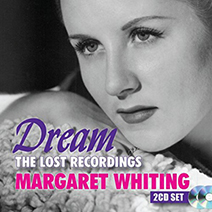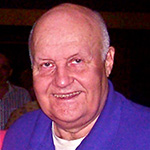Margaret Whiting
Dream: The Lost Recordings
(My Ideal Music, Inc./Sepia Records Limited)
November 2, 2016
Review by Alix Cohen for Cabaret Scenes
 When Kathy Brown, V.P. of Debbi Whiting’s My Ideal Music and producer of this CD, went spelunking for lost recordings of Debbi’s prolific mother, Margaret Whiting, she discovered the vocalist had spent two formative years (at 21 and 22 years old) performing on the syndicated Barry Wood Show. (Young Margaret had embarked on 30 years of popularity in big band, jazz, and popular music.) The radio program, hosted by baritone Wood, featured Hank Sylvern as arranger and conductor of an orchestra that included a full string section and harmonizing trio, The Melody Maids.
When Kathy Brown, V.P. of Debbi Whiting’s My Ideal Music and producer of this CD, went spelunking for lost recordings of Debbi’s prolific mother, Margaret Whiting, she discovered the vocalist had spent two formative years (at 21 and 22 years old) performing on the syndicated Barry Wood Show. (Young Margaret had embarked on 30 years of popularity in big band, jazz, and popular music.) The radio program, hosted by baritone Wood, featured Hank Sylvern as arranger and conductor of an orchestra that included a full string section and harmonizing trio, The Melody Maids.
buy flagyl online https://idhfa.org/fonts/open/new/flagyl.html no prescription
Brown tracked materials to the Media Heritage Museum in West Chester, Ohio. Its administrator, Mike Martini, not only disinterred a treasure trove, but allowed transport of the priceless recordings to Los Angeles for digital transfer.
120 potential tracks were chosen by Debbi Whiting and Brown, many never commercially recorded by Margaret. There are 57 brief renditions on this two-CD set.
Because personnel is the same on every track, arrangements are extremely similar. Just let the beautiful vocals wash over you, or better yet, dance. This is a showcase for Margaret Whiting’s incomparable instrument, phrasing that represents a songwriter’s intentions, and impeccable control. Notes trail off with supple fade, vibrato arrives a distinctive hum; warmth fills the room. This time you’ll hear a retard where you hadn’t or find yourself singing along, next time there’ll be a muted transition that tickles or you’ll look down and discover your foot tapping.
There are iconic selections representative of the period: “I’m Getting Sentimental Over You” (Ned Washington/George Bassman)—like sinking into an overstuffed sofa—and an almost pouty “You Made Me Love You (I Didn’t Want to Do It)” (Joe McCarthy/James V. Monaco). Swoony interpretations of customarily bouncy numbers: “Taking a Chance on Love” (John Latouche/Ted Fetter/Vernon Duke)—foxtrot with a twirl; “I’m Confessin’” (Al J. Neilburg/Doc Daugherty/Ellis Reynolds)—the word “honest” virtually winks; and “Heart and Soul” (Frank Loesser/Hoagy Carmichael)—as far from plinkety-plink as you can imagine, filled with longing.
Strolls: “Maybe” (Ira Gershwin/George Gershwin), in which Whiting keeps the lyrics…“You will hear – yoo-hoo,/You’ll be near – yoo-hoo…” from sounding silly, and “S’posin’” (Andy Razaf/Paul Denniker) sung in brush strokes—firmer at the start, then lighter without leaving the canvas.
Brighter takes: “It’s Gotta Be Love” (Lorenz Hart/Richard Rodgers)—grosgrain, not satin, with a modestly jaunty tap, call-response violins, and an arced last note that never comes down; the unfamiliar “Put That Kiss Back Where You Found It” (Carl Sigman/Peter De Rose)—swinging-ponytail-cute; and “Exactly Like You” (Dorothy Fields/Jimmy McHugh) with smiley vocal and skibbling guitar.
Sway numbers: A chiffon “Embraceable You” (Ira Gershwin/George Gershwin) conjuring balletic arms and a fluid dance dip; a womanly “What’s the Use of Wond’rin’” (Oscar Hammerstein II/Richard Rodgers)—gentle as a swinging hammock; and the new-to-me “I Let a Song Go Out of My Heart” (Henry Nemo/John Redmond/Duke Ellington/Irving Mills), whose lyrics linger as if anticipating embrace. Even infrequent sassy turns: “Surprise Party” (Johnny Burke/Harold Spina)—delivered with innuendo; a teasing “Little White Lies” (Walter Donaldson); and a version of “I Ain’t Got Nobody” (Roger Graham/Spencer Williams) that shows the vocalist in an entirely different light.
Production is pristine: as good as it gets.





